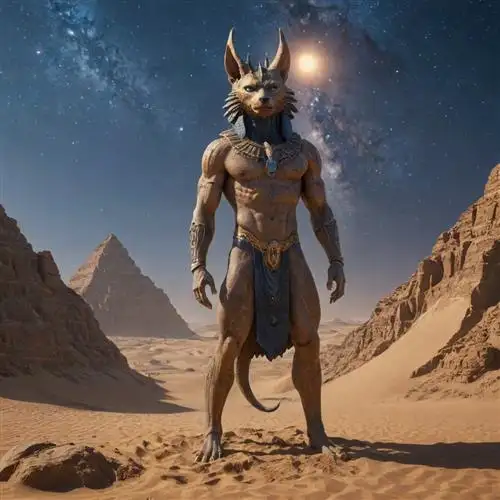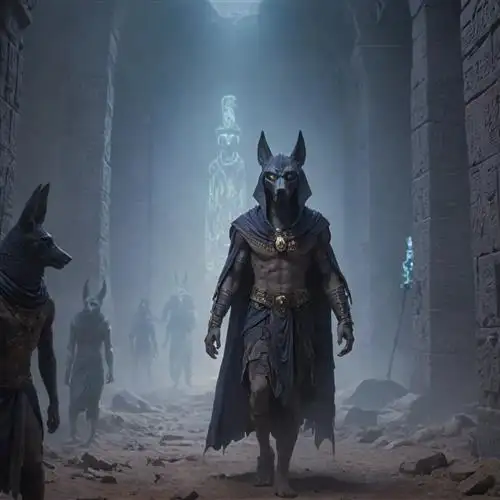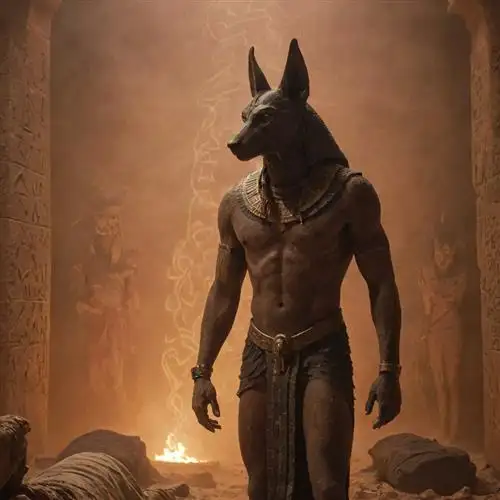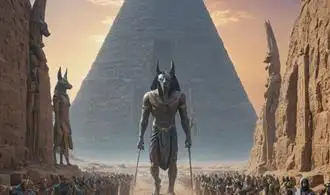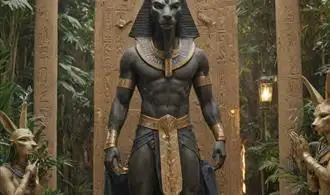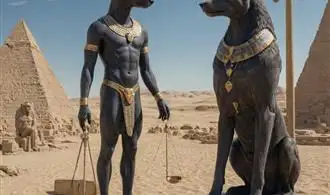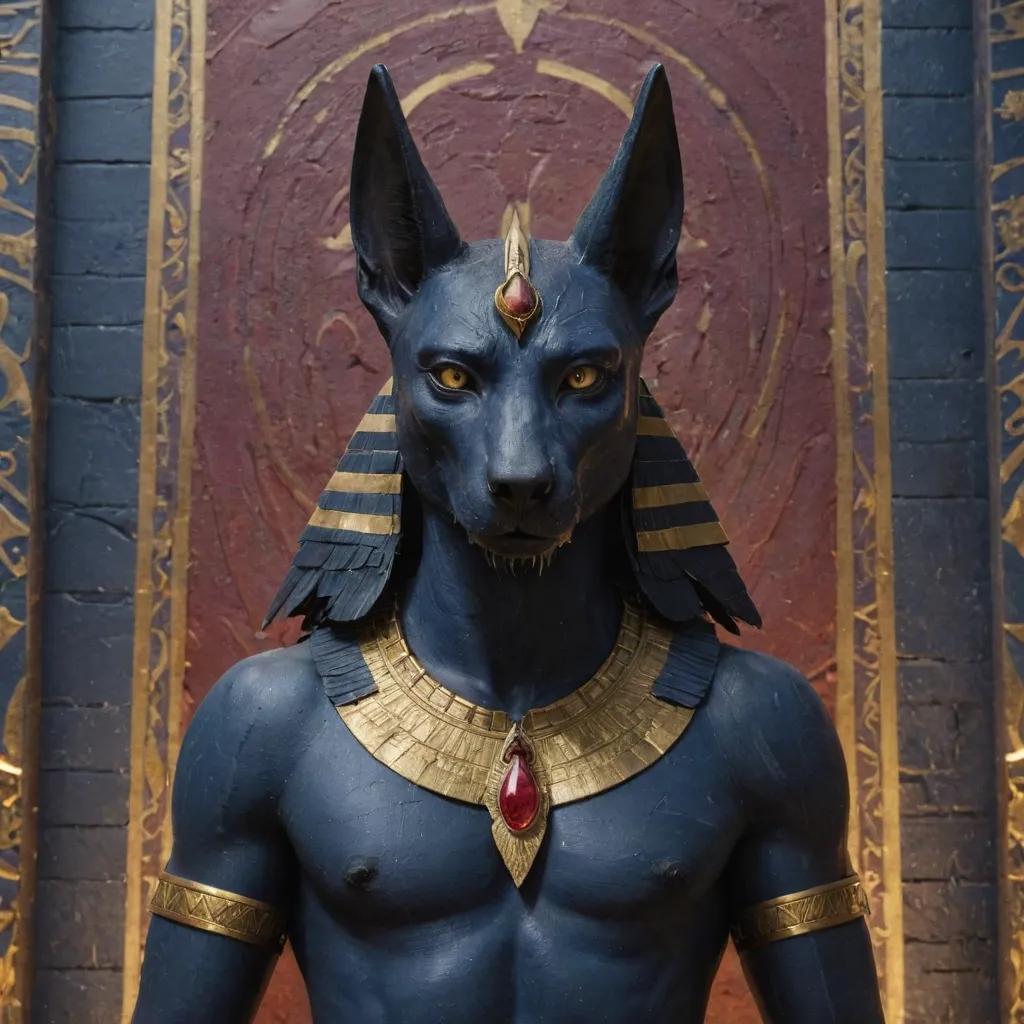
Anubis The Jackal Headed God
Anubis, the enigmatic jackal-headed god of ancient Egypt, has long been revered for his profound wisdom and guidance in the realm of the afterlife. As the patron deity of embalming and the protector of the dead, Anubis held a pivotal role in the intricate rituals and beliefs surrounding death and the journey into the afterlife.
One of the most captivating aspects of Anubis is his multifaceted nature. Beyond his role as the gatekeeper to the underworld, Anubis was also seen as a deity of transition, transformation, and regeneration. His jackal-like appearance was not merely a symbolic representation, but rather a reflection of his profound understanding of the duality inherent in the cycle of life and death.
The ancient Egyptians believed that Anubis was responsible for guiding the souls of the deceased through the perilous terrain of the underworld, ensuring their safe passage to the realm of the afterlife. This belief was grounded in the idea that Anubis possessed a deep knowledge of the secrets and mysteries that lay beyond the veil of mortality.
For those seeking to transform their lives and tap into the wisdom of Anubis, there are several powerful lessons to be gleaned. Firstly, Anubis reminds us of the importance of confronting our fears and embracing the unknown. Just as the jackal-headed god guided the dead through the challenges of the underworld, we too can learn to navigate the uncertain and sometimes daunting aspects of our own lives with courage and resilience.
Secondly, Anubis embodied the principle of balance and equilibrium. He was seen as the guardian of the delicate scales that weighed the hearts of the deceased against the feather of Ma'at, the goddess of truth and justice. This metaphor speaks to the significance of maintaining a harmonious state of being, where our thoughts, actions, and values are aligned with the greater cosmic order.
Finally, Anubis' association with transformation and regeneration offers a profound lesson in the cyclical nature of existence. Just as the jackal-headed god presided over the process of mummification and the preservation of the physical body, we too can learn to embrace the inevitable changes and transitions that shape our lives, finding the opportunity for growth and rebirth in even the most challenging of circumstances.
Anubis The Guardian of the Dead
Anubis, the enigmatic jackal-headed god of ancient Egypt, has long been revered as the guardian of the dead. As one of the most prominent deities in the Egyptian pantheon, Anubis played a crucial role in the journey of the soul from life to the afterlife. Understanding the profound wisdom and significance of Anubis can help individuals transform their lives and find a deeper connection with the divine.
At the heart of Anubis's role as the guardian of the dead lies the concept of maat, the foundational principle of ancient Egyptian philosophy. Maat represents cosmic order, justice, and balance, and Anubis was responsible for ensuring that the deceased's heart was weighed against the feather of truth during the final judgment. This process, known as the "Weighing of the Heart," was a critical step in determining whether the individual was worthy of eternal life in the afterlife.
The wisdom of Anubis extends beyond the realm of the dead and can be applied to the living as well. Anubis was often associated with embalming and the preservation of the physical body, which can be seen as a metaphor for the importance of self-care and the protection of one's own well-being. By embracing Anubis's teachings, individuals can learn to safeguard their mental, emotional, and spiritual health, ensuring that they are well-prepared for the inevitable journey of life.
Moreover, Anubis's role as the guide of the dead can be interpreted as a symbol of the transformative power of change and transition. Just as Anubis accompanied the deceased on their final journey, the god can serve as a beacon of hope and guidance for those facing significant life changes or challenges. By aligning oneself with the principles of Anubis, individuals can learn to navigate the often-turbulent waters of transition with grace and resilience.
Anubis The Psychopomp
Anubis, the ancient Egyptian deity associated with the afterlife, holds a profound and multifaceted role in the spiritual and metaphysical realms. As a psychopomp, a being that guides souls to the afterlife, Anubis is revered for his ability to facilitate the transition from this world to the next. This aspect of Anubis' divine responsibilities holds immense significance for those seeking to transform their lives through the wisdom and guidance of this powerful deity.
At the core of Anubis' role as a psychopomp is the concept of death and transformation. The Egyptian god is responsible for guiding the deceased through the process of mummification, ensuring the preservation of the physical body and the safe passage of the soul to the afterlife. This process symbolizes the transformation that occurs during the transition from life to death, a transformation that holds profound lessons for the living.
For those seeking personal growth and transformation, Anubis' role as a psychopomp can offer invaluable guidance. The process of "dying to the old self" and embracing a new, transformed version of oneself is often a necessary step in personal development. Anubis can assist in this process by helping individuals let go of limiting beliefs, behaviors, and attachments that no longer serve them, paving the way for a rebirth into a higher state of being.
Moreover, Anubis' association with the afterlife and the journey of the soul holds important lessons for those seeking to deepen their spiritual understanding. As a deity responsible for the weighing of the heart against the feather of truth, Anubis represents the importance of self-reflection, honesty, and accountability in one's personal and spiritual journey. By acknowledging and addressing the shadows within, individuals can embrace the transformative power of Anubis' wisdom and guidance.
In the realm of death and transformation, Anubis also serves as a guardian and protector. The Egyptian god is believed to watch over the deceased, ensuring their safe passage and protecting them from the dangers of the underworld. This aspect of Anubis' divine responsibilities can provide a sense of comfort and security for those facing the challenges of life, death, and the unknown.
Anubis The Embalmer
Anubis, the jackal-headed Egyptian god, is renowned for his role as the divine embalmer. This ancient deity was responsible for the meticulous mummification process, ensuring the deceased's safe passage to the afterlife. Understanding the significance of Anubis as the embalmer can offer profound insights into transforming one's own life.
At the heart of Anubis' role as the embalmer lies the concept of preservation. In the Egyptian tradition, the process of mummification was a sacred ritual that meticulously prepared the physical body for the journey beyond this world. Similarly, Anubis' wisdom encourages us to preserve and protect the essential aspects of our own lives, safeguarding our most cherished values, beliefs, and experiences.
The embalming process performed by Anubis is a powerful metaphor for the transformative journey we can undertake in our own lives. Just as the deceased were carefully cleansed, anointed, and wrapped in linen, we too can engage in a process of spiritual and emotional purification. By shedding the unnecessary attachments and limiting beliefs that weigh us down, we can emerge renewed and rejuvenated, ready to embrace the next chapter of our lives.
Anubis, as the embalmer, also represents the importance of attention to detail and meticulous care. In the mummification process, every step was carried out with utmost precision, ensuring the preservation of the body. This attention to detail can be applied to our own lives, encouraging us to approach our goals, relationships, and personal growth with the same level of diligence and care.
Furthermore, Anubis' role as the embalmer symbolizes the profound transformation that occurs in the transition from life to death. This process of transformation is not limited to the physical realm but can be applied to the emotional, mental, and spiritual aspects of our being. By embracing the wisdom of Anubis, we can learn to navigate the ebb and flow of life's cycles, navigating the ebbs and flows with grace and resilience.
Anubis The Weigher of Souls
Anubis, the enigmatic Egyptian deity, has long been revered as the Weigher of Souls, a powerful figure responsible for guiding the dead through the afterlife. As the patron of embalming and protector of the dead, Anubis holds a crucial role in the ancient Egyptian belief system, offering wisdom and insight into the mysteries of the beyond.
At the heart of Anubis' role as the Weigher of Souls lies the ritual of the Weighing of the Heart, a critical stage in the Egyptian afterlife journey. During this ceremony, the deceased's heart was weighed against the feather of Ma'at, the goddess of truth and justice. If the heart proved lighter than the feather, the soul would be deemed worthy and allowed to proceed to the next stage of the afterlife. However, if the heart was heavier, it would be devoured by the devouring monster Ammit, condemning the soul to eternal oblivion.
The Weighing of the Heart not only determined the fate of the deceased but also served as a powerful metaphor for the importance of living a life of virtue and integrity. Anubis, as the Weigher of Souls, became a symbol of the need for personal accountability and the consequences of one's actions. By honoring Anubis and seeking his guidance, individuals could strive to align their hearts with the principles of Ma'at, ensuring a smooth transition into the afterlife.
Beyond the Weighing of the Heart, Anubis' role as the Protector of the Dead also held profound significance. As the patron of embalming and mummification, Anubis ensured the preservation of the physical body, which was believed to be essential for the soul's journey through the afterlife. By guiding the embalming process and safeguarding the deceased, Anubis played a crucial part in the Egyptian funerary rites, ensuring the departed's safe passage to the next realm.
Interestingly, Anubis' iconography as a jackal-headed deity also holds deep symbolic meaning. The jackal, a scavenger that frequented ancient Egyptian cemeteries, was associated with the transition between the realms of the living and the dead. Anubis' jackal-like appearance thus reinforced his role as a liminal figure, bridging the gap between the physical world and the spiritual realm.

